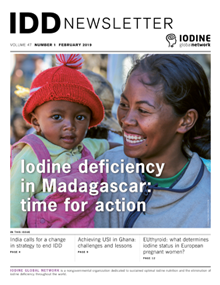A recent national survey showed that iodine deficiency remains a serious public health problem in Madagascar, putting babies at risk of being born with mental impairment. The government now has an opportunity to revitalize the national salt iodization program thanks to the generosity of Japanese donors, and ongoing support from UNICEF, USAID and IGN.
Iodine Global Network (IGN)
Sprunglinks/Accesskeys
Zur Startseite (Accesskey 0) Direkt zur Hauptnavigation (Accesskey 1) Direkt zum Inhalt (Accesskey 2) Kontakt (Accesskey 3) Sitemap (Accesskey 4) Suche (Accesskey 5)Hauptnavigation
Suche
- back
- you are here:
- IDD Newsletter >
- IDD Newsletter Library >
- 2019
04.03.2019 IDD Newsletter 1/2019
In this issue:
In Meetings and Announcements:
|
In Meetings and Announcements:
|
Articles
Iodine deficiency in Madagascar: time for action
(Festo Kavishe, Isiye Ndombi, Minoru Irie, Marie-Claude Desilets, Bodo Rakotomalala)
India calls for a change in strategy to end IDD through the National Nutrition Mission
(Kapil Yadav, Chandrakant S Pandav)
India has made impressive progress in efforts to control iodine deficiency with the successful adoption and scaling up of universal salt iodization (USI). But to bring iodized salt to more than 90% of the country’s population and to sustain optimal iodine intakes, India needs to strengthen its ‘end game’.
Progress towards optimal iodine nutrition in Eastern Europe
(Gregory Gerasimov)
A regional update with a focus on Belarus, Moldova, Ukraine, and Russia.
Iodization of foods and condiments other than salt can increase population iodine intakes
(Excerpted from: Santos JAR et al., doi: 10.1002/14651858.CD010734)
A systematic review assessed the effects of fortifying foods, beverages, condiments, or seasonings other than salt with iodine on iodine status and health-related outcomes in all populations.
Achieving USI in Ghana: challenges and lessons
(Excerpted from: Abu BAZ et al. Annals of the New York Academy of Sciences 2018 Nov 29.)
This paper reviews existing evidence on exposure to iodine in the food system in Ghana and describes policies, strategies, and programs linked with iodine nutrition in the country.
Common factors determining iodine status in pregnancy across Europe
(Excerpted from: Dineva M et al. European Journal of Nutrition 2019 Feb 8:1-7.)
A study funded by the EUthyroid project identified the determinants of iodine status during early pregnancy in three European populations of differing iodine status.
Inadequate iodine intake in large groups of the Norwegian population
(Henjum S, Abel MH, Meltzer HM, Dahl L, Alexander J, Torheim LE, Brantsæter AL)
A recently published review suggests that, in Norway, inadequate iodine intakes are widespread among women of childbearing age, pregnant and breastfeeding women, infants who are exclusively breastfed, the elderly, vegans and some immigrant groups. There are few sources of iodine in the diet, and individuals who avoid milk and white fish, or have increased iodine needs, are particularly at risk.
Global Nutrition Report: A strong case for salt iodization
(Excerpted from: Garrett GS, Gorstein J, Kupka R and Martinez H. 2018 Global Nutrition Report.)
According to the 2018 Global Nutrition Report, micronutrient deficiencies impact a significant number of people around the world. Yet, there is far too little information on micronutrient status and deficiencies. More essential information and surveillance need to be gathered to make substantial progress on global targets.
Food fortification could be the next global health success story – if countries close the gaps
(Excerpted from a GFDx press release, February 2019.)
Two-thirds of the world’s countries mandate food fortification, yet many of those countries are not translating policy into improved nutrition, according to new data from the Global Fortification Data Exchange (GFDx) – and may be missing an immense opportunity to support healthier children and mothers, bolster communities, and boost national economies.


